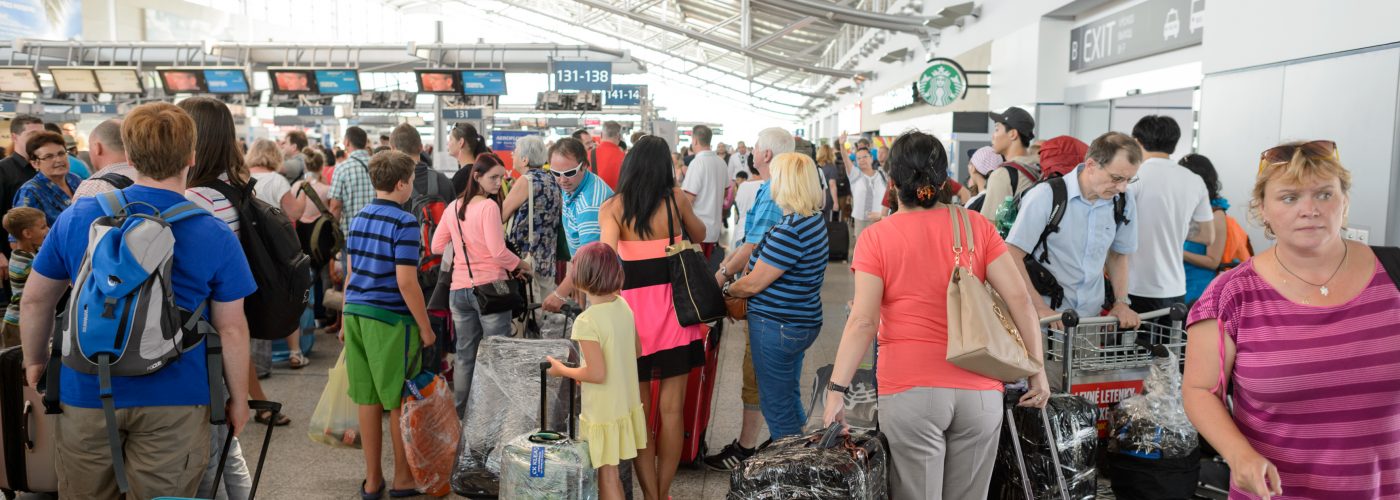According to a stunning report by the Boston Globe, the TSA has been operating a secret airport surveillance program called Quiet Skies that tracks passengers who are not otherwise suspected to be a threat. “Federal air marshals have begun following ordinary US citizens not suspected of a crime or on any terrorist watch list,” the Globe reports, and is “collecting extensive information about their movements and behavior under a new domestic surveillance program that is drawing criticism from within the agency.”
Quiet Skies “specifically targets travelers who ‘are not under investigation by any agency and are not in the Terrorist Screening Data Base,’ according to a Transportation Security Administration bulletin in March.” The internal TSA bulletin says the purpose of the program is to undercut threats “posed by unknown or partially known terrorists.”
Airports being surveilled in the program, according to the Globe, include those in Seattle, San Francisco, Boston, New York, Philadelphia, Washington D.C., Detroit, Chicago, Minneapolis, Las Vegas, Phoenix, Houston, Atlanta, Miami, Charlotte, Harrisburg (PA), and Myrtle Beach.
Thousand of Americans Have Been Tracked
According to documents reviewed by the Globe, “thousands of unsuspecting Americans have been subjected to targeted airport and inflight surveillance, carried out by small teams of armed, undercover air marshals [who] document whether passengers fidget, use a computer, have a ‘jump’ in their Adam’s apple or a ‘cold, penetrating stare,’ among other behaviors.”
A separate internal TSA bulletin from May, which notes that travelers entering the United States may be added to the Quiet Skies watch list if their “international travel patters [sic] or behaviors match the travel routing and tradecraft of known or suspected terrorists,” or “are possibly affiliated with Watch Listed suspects.”
What the Globe describes is a surveillance program that essentially targets anyone, for reasons that are not entirely clear. The Globe cites some examples—a businesswoman “who happened to have traveled through a Mideast hot spot,” a Southwest Airlines flight attendant, and a law enforcement officer—none of whom were determined to pose a threat.
Instant Controversy
Unsurprisingly, the program has critics within the TSA itself, and now outside of it as well.
John Casaretti, president of the Air Marshal Association, said in a statement that “the Air Marshal Association believes that missions based on recognized intelligence, or in support of ongoing federal investigations, is the proper criteria for flight scheduling. Currently the Quiet Skies program does not meet the criteria we find acceptable.”
Further, the Globe reports that “several air marshals, who spoke on the condition of anonymity because they are not authorized to speak publicly, told the Globe the program wastes taxpayer dollars and makes the country less safe because attention and resources are diverted away from legitimate, potential threats.”
It’s also unclear if the program is even legal. “If this was about foreign citizens, the government would have considerable power,” George Washington University law professor Jonathan Turley told the Globe. “But if it’s U.S. citizens — U.S. citizens don’t lose their rights simply because they are in an airplane at 30,000 feet. There may be indeed constitutional issues here depending on how restrictive or intrusive these measures are.”
What Now?
Needless to say, there is much the public needs to learn about this program. On the surface it seems deeply troubling—essentially a covert surveillance operation that targets U.S. citizens without cause. In a statement to CNN, the TSA disputed this characterization by saying: “The program absolutely isn’t intended to surveil ordinary Americans. Instead, its purpose is to ensure passengers and flight crew are protected during air travel … The program analyzes information on a passenger’s travel patterns while taking the whole picture into account and adds an additional line of defense to aviation security.”
But if identifying, targeting, following, and documenting the behaviors of ordinary, unsuspecting Americans isn’t surveillance, then what is it? You can bet that the ACLU, and perhaps Congress, will be asking the TSA that same question.
More from SmarterTravel:
- TSA Failure: Agency Falls Short on Most Undercover Screening Tests
- Faster TSA Bag Scanners Are One Step Closer to Reality
- Not Just Liquids: TSA Adds New Rule for Carry-ons That Will Change How You Pack
We hand-pick everything we recommend and select items through testing and reviews. Some products are sent to us free of charge with no incentive to offer a favorable review. We offer our unbiased opinions and do not accept compensation to review products. All items are in stock and prices are accurate at the time of publication. If you buy something through our links, we may earn a commission.
Related
Top Fares From
Today's Top Travel Deals
Brought to you by ShermansTravel
France: 8-Night Paris, Avignon & Nice...
Infinity Worldwide Vacations
 vacation
$2880+
vacation
$2880+
Poconos: 3 Nts in Garden of...
ResortsAndLodges.com
 hotel
$305+
hotel
$305+
7-Nt Canada & New England Cruise,...
Princess Cruises
 cruise
$839+
cruise
$839+




